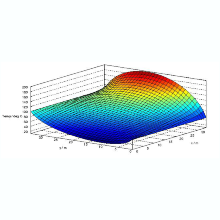- Lecturer:
- Lecture start:
-
14.10.2024
- Language:
-
English
- Course ID number:
-
340743100
This core course of the COMMAS program gives an overview of different approaches for the numerical solution of differential equations. Most phenomena in physics are governed by differential equations. This lecture explores some of these problems, including structural problems in statics and dynamics, temperature field problems, and diffusion processes. This course focuses specifically on:
-
Classification of differential equations Derivation of differential equations for various physical problems
-
Finite Difference Method (FDM): order of error, system matrices, Dirichlet and Neumann boundary conditions, ghost points
-
Time integration: Euler forward, Euler backward, central difference method, Crank-Nicholson scheme, Newmark's method, stability considerations
-
Weighted residuals: subdomains, collocation method, Galerkin's method, least squares
-
Finite Element Method: derivation from weighted residuals, Galerkin's functional, element matrices, numerical treatment of boundary conditions, continuity requirements of shape functions
Along with the lecture, a manuscript is available that covers the contents of the lecture. All numerical examples within the manuscript can be downloaded as MATLAB files (so-called m-files, see below). Also, the numerical examples in the exercises are available as m-files. Finally, a computer lab will be part of the lecture, wherein the students have to complete some basic programming assignments with MATLAB. Since MATLAB is a widely used software for numerical calculation and visualization, all students are encouraged to become familiar with MATLAB.
All m-files are well documented and include a referencing to the respective equation numbers in the manuscript. In the first part of all m-files, parameters are defined which can easily be changed by the user. Thus, parametric studies can easily be carried out, e.g. the student can readily investigate the influence of the discretization on the convergence behavior or the stability limit of time-integration schemes. The students are encouraged to make use of this facility or even write their own programs since practical experience in COMPUTATIONAL MECHANICS cannot be replaced by pure theoretical knowledge.
Exercises
| exercise2.m | exercise3.m | exercise3_maple.mw |
Seminar lecture 12/12/16
| CSimp.m.txt | CTrap.m.txt | GCheby.m.txt |
| GHerm.m.txt | GLagu.m.txt | GLege.m.txt |
| GLoba.m.txt | NC.m.txt |
Seminar lecture 13/01/14
| MassSpring.rar | MassSpringDamper.rar | MultiDegreesofFreedom.rar |
Additional Stuff
A simple example for a 'discretization method' is the numerical integration of a function. This can be done <here>.
An example for the classification of second-order PDE's is given <here>.
A presentation (pdf format) of how the system matrix and the load vector of a 2d truss structure is obtained can be downloaded <here>.
An m-file that allows for the definition of an arbitrary 2d truss structure and the calculation of the static deflection is given <here>.
Taking under consideration the mass of the truss structure and performing a time integration (Central Difference Method and Newmark's Method), a <dynamical calculation> can be performed.
Two animations <1> and <2> of a dynamic calculation are also available.
| type: | written examination, 120 min |
| auxiliary means: | script ’Discretization Methods’ handwritten lecture notes no electronic devices |
| consultation hours: | to be announced in the lecture |
- M.Sc. Computational Mechanics of Materials and Structures: Core Module
- M.Sc. Maschinenbau: Ergänzungsmodul im
Spezialisierungsfach Nichtlineare Mechanik - DoubleM.D. Maschinenbau: Ergänzungsmodul in
Areas of Specialization: Nichtlineare Mechanik - M.Sc. Mechatronik: Ergänzungsmodul im
Spezialisierungsfach Nichtlineare Mechanik - M.Sc. Technische Kybernetik: Ergänzungsmodul im
Spezialisierungsfach Nichtlineare Mechanik - M.Sc. Technologiemanagement: Ergänzungsmodul im
Spezialisierungsfach Nichtlineare Mechanik - B.Sc. Simulation Technology: Zusatzmodul
- M.Sc. Simulation Technology: Wahlmodule
- M.Sc. Simulation Technology: Zusatzmodul
This course is part of the (COMMAS) module „Discretization Methods and Scientific Programming“. It is also offered in the framework of the „Spezialisierungsfach Nichtlineare Mechanik“. Any other student who is interested in participating is encouraged to contact Dr. André Schmidt.
Contact



